...
{*no-status title-slide} - - - - ## Outline {#the-overview} - Background - What is open science? - Sharing of scientific resources - Counter norm and barriers - Aim of this project - Data and Research Setting - Results - Privatization of scientific resources - Does sharing lead to innovation? - Conclusions ## Open science
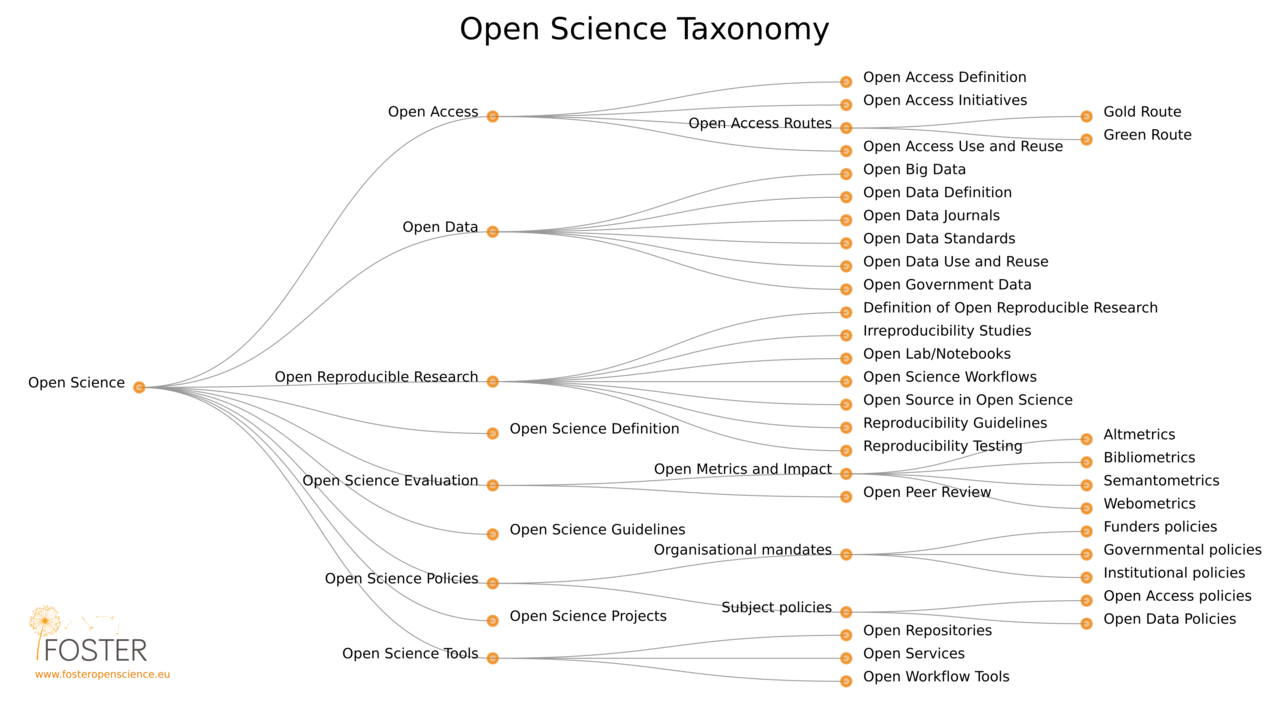 ## Open science - Norm of science
- fundamental scientific norm, prescribing unconditional sharing of scientific discoveries and resources among scientists (Dasgupta and David, 1994; Merton, 1973) {slide}
- norm of "communism" {slide}
- indispensability of openness in science where individual scientists have the ownership right only to recognition for the discoveries (Barber, 1952; Merton, 1973)
- practice of collective contribution: e.g. in peer review, but also in sharing
- “a requirement for responsible scholarship” (Journal of Political Economy, 1975, p. 1296)
- crucial for the replication, validation and advancement of research (Walsh et al., 2007; Shibayama and Baba, 2011; The Royal Society, 2012), ideals embraced by most researchers (Nelson, Nature, 2009) {slide}
## Open science - Policy push
- recent policy push towards open science and open data, e.g. G8 Science Ministers joint statement in 2013 (Knowledge Exchange, 2014; Digital Science, 2016; Owens, 2016)
- Open access/data mandate
- open access and data depositing mandated by funding agencies (e.g. OECD 2004; NIH 2003; RCUK 2011)
- central repositories (e.g., Jackson Lab; Dataverse) - outsourcing the operation of preserving and delivering the materials (Furman and Stern, 2011)
- National Academies of Science (NAS) states that
## Open science - Norm of science
- fundamental scientific norm, prescribing unconditional sharing of scientific discoveries and resources among scientists (Dasgupta and David, 1994; Merton, 1973) {slide}
- norm of "communism" {slide}
- indispensability of openness in science where individual scientists have the ownership right only to recognition for the discoveries (Barber, 1952; Merton, 1973)
- practice of collective contribution: e.g. in peer review, but also in sharing
- “a requirement for responsible scholarship” (Journal of Political Economy, 1975, p. 1296)
- crucial for the replication, validation and advancement of research (Walsh et al., 2007; Shibayama and Baba, 2011; The Royal Society, 2012), ideals embraced by most researchers (Nelson, Nature, 2009) {slide}
## Open science - Policy push
- recent policy push towards open science and open data, e.g. G8 Science Ministers joint statement in 2013 (Knowledge Exchange, 2014; Digital Science, 2016; Owens, 2016)
- Open access/data mandate
- open access and data depositing mandated by funding agencies (e.g. OECD 2004; NIH 2003; RCUK 2011)
- central repositories (e.g., Jackson Lab; Dataverse) - outsourcing the operation of preserving and delivering the materials (Furman and Stern, 2011)
- National Academies of Science (NAS) states that "[a]n author’s obligation is not only to release data and materials to enable others to verify or replicate published findings but also to provide them in a form on which other scientists can build with further research” (NAS, 2003)## Sharing of scientific resources - What is shared? - scientists frequently share research materials (such as chemical compounds or proteins) (Blumenthal et al., 1997; Walsh et al., 2007) as some researchers may lack expertise to create these - not all resources are easily accessible to all researchers (equipment, data) - also sharing of protocolls, questionnaires and other documentation - Is sharing ubiquitous? {slide} - voluntary open data sharing still rare - most will state that they are willing to share (pro-social response) - most have simply not considered it (Wallis et al., 2013) {in-red} - <3% of economists share in a comprehensive and clear way (Andreoli-Versbach, 2014) - a third of survey respondents agree that others can access their data easily; 6% make all their data available (Tenopir et al., 2015) - most have simply not considered it (Fecher et al., 2015) - but researchers respond to "specific" requests {slide} - 80-95% of requests for sharing are fulfilled (Czarnitzki et al., 2015; Shibayama and Baba, 2011; Walsh et al., 2007) ## Counter-norms and barriers - Counter-norms to communism norms - favours "protective control over the disposition of one's discoveries" (Mitroff, 1974) - witholding of resources in a competitive environment to maintain "edge" - scientists with commercial orientation (e.g., patenting, commercial engagement) delay publication, conceal information from publication, and withhold material and data (Blumenthal et al., 1997; Blumenthal et al., 2006; Murray, 2010; Walsh et al., 2007; Shibayama et al. 2012; Czarnitzki et al., 2015) - bartered for favours, e.g. other resourcesHilgartner and Brandt-Rauf, 1994); expectation of reciprocity, e.g. co-authorship and collaboration Shibayama et al. 2012; Haeussler, 2011) - Main barriers to open science (Fecher et al., 2015; Tenopir et al., 2015) {slide} - lack of time/knowledge - fear of loss of research credit / need to publish - difficulty of ensuring fair use ## Questions we look to answer - How open is resource sharing and what are the practices?
What is the role of competition?
(with Sotaro Shibayama)
- Under what conditions does sharing lead to progress or innovation in research?
(with Masaru Yarime, Sotaro Shibayama and Miho Funamori) {slide} ## Some more background - Sharing with and without direct returns - Social exchange theory: direct exchange and generalised exchange (Ekeh, 1974; Emerson, 1981; Molm, 1994; Molm et al., 2007; Takahashi, 2000) {slide} - NAS (2003):
"it is unacceptable to require collaboration or coauthorship as a condition of providing a published material"{slide} - Sharing and scientific advancement - some limited case study evidence: the sharing of specific research resources in the biosciences has positive effect on research accumulation (Murray, 2010; Furman and Scott, 2011; Murray et al., 2016) {slide} - other evidence in case of firms and interplay between science and firm R&D {slide} # Data and Research Setting ## Japan - Germany - UK
"requirement for reciprocity can inhibit a scientist from publishing findings that are contrary to the provider’s published conclusions."
Article share (world)
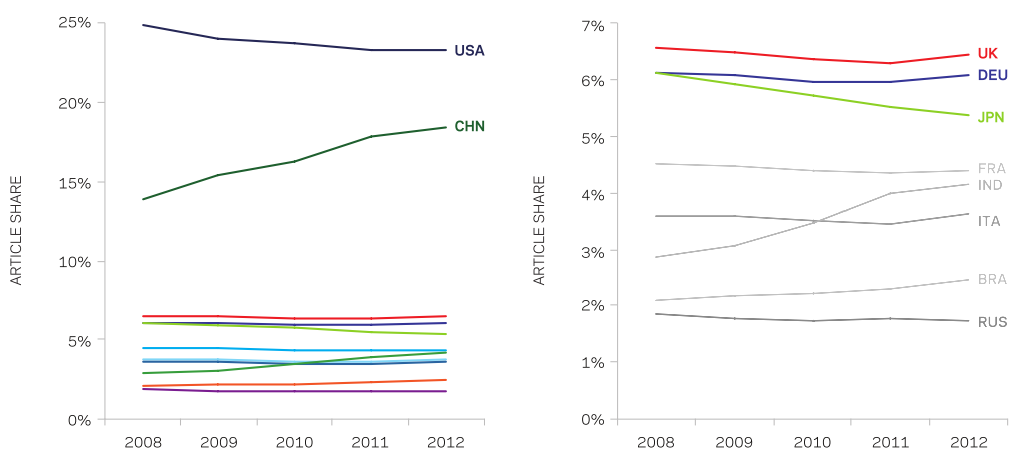 Note: Based on documents listed in Scopus and generated by Elsevier
Note: Based on documents listed in Scopus and generated by ElsevierSource: BIS/13/1297
{*no-status title-slide} ## Research question - How open is resource sharing and what are the practices? - we differentiate between generalised and direct exchange - direct exchange is prefererred where competition and commercialisation are more pronounced ## Generalised vs. direct exchange
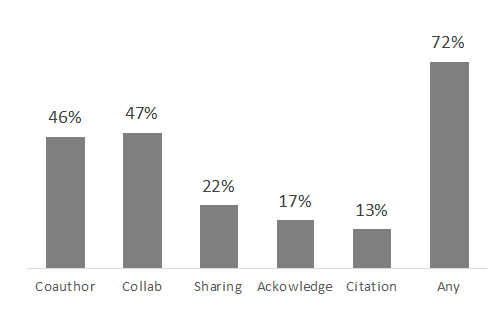 ## Generalised vs. direct exchange
## Generalised vs. direct exchange
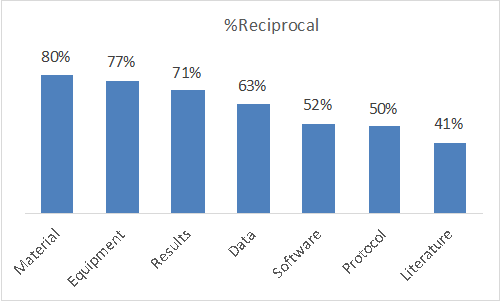

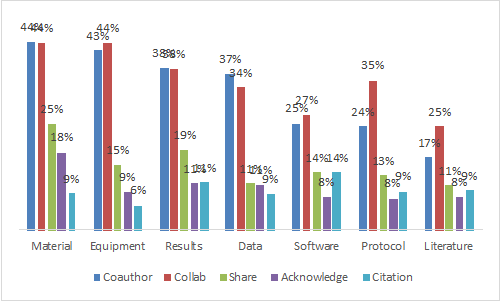
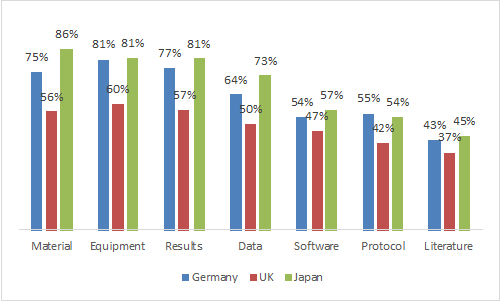

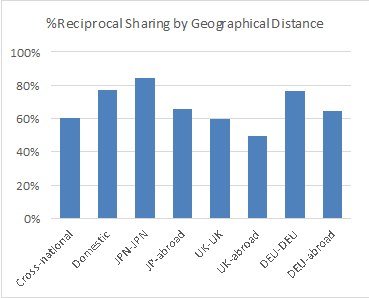


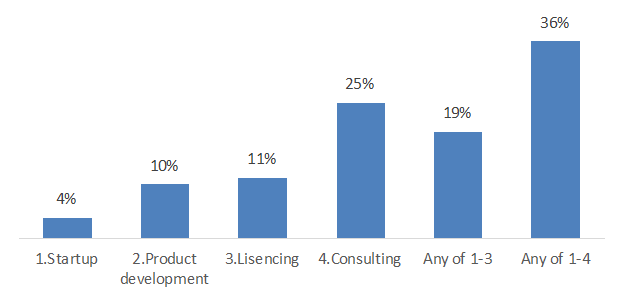 ## Results (direct/reciprocal sharing)
## Results (direct/reciprocal sharing)
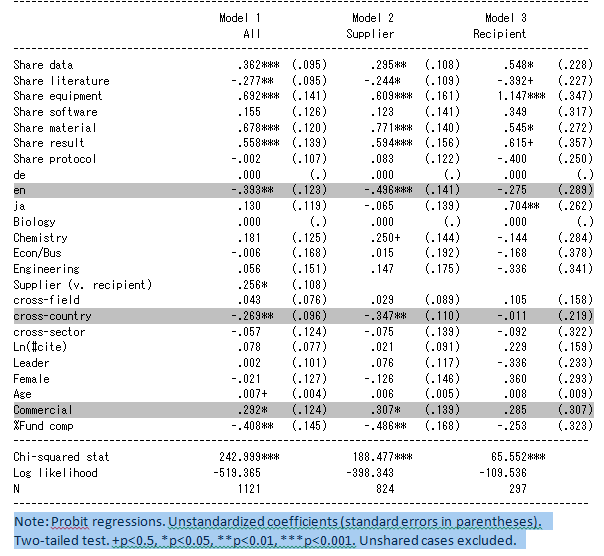 ## Competition
## Competition
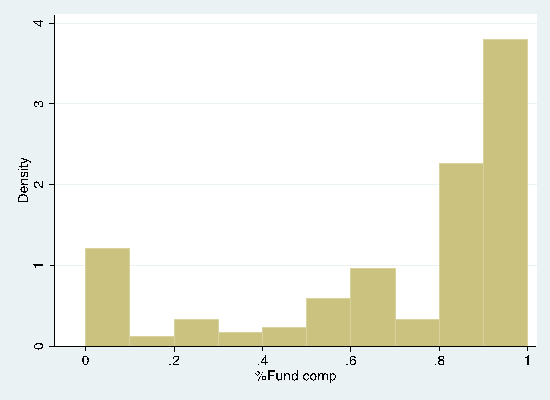
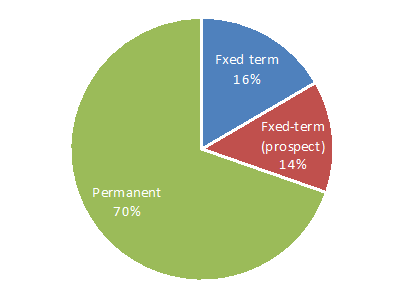

 ## Preliminary Findings
- Commercialisation - impacting reciprocity behaviour
- Competition - less clear; junior researchers at least concerned about correct citation and acknowledgements
- Country effects - UK researchers more generalised exchange; cross-country sharing more generalised
## Extensions / Future Work
- Country of sharing request - any bias? {slide}
- Time trend? we compare to 2009 bioscience Japan survey {slide}
-
## Preliminary Findings
- Commercialisation - impacting reciprocity behaviour
- Competition - less clear; junior researchers at least concerned about correct citation and acknowledgements
- Country effects - UK researchers more generalised exchange; cross-country sharing more generalised
## Extensions / Future Work
- Country of sharing request - any bias? {slide}
- Time trend? we compare to 2009 bioscience Japan survey {slide}
- 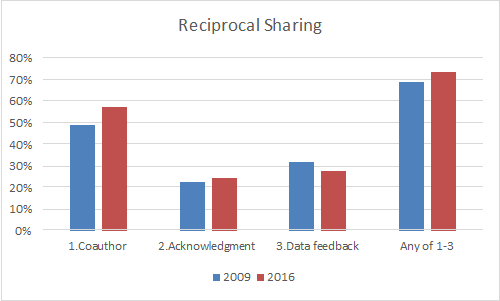 {slide}
#
{slide}
# {*no-status title-slide} ## Sharing and innovation - did sharing lead to progress or innovation in research? - 26% do not know (providers) - 12% little or no progress - 43% some progress made - 38% some progress made in interdisciplinary field - 6% progress in entirely new field - Ordered logit and logit models - Selection model to account for "do not know" group ## Sharing and innovation - requires more than aquiring resources: agreements - 74% collaboration or co-authorship - 12% mention: acknowledgements, citations - 14% none - dependent on motivations/aims behind sharing {slide} - 74% collaboration - 54% advance research ## Descriptive statistics
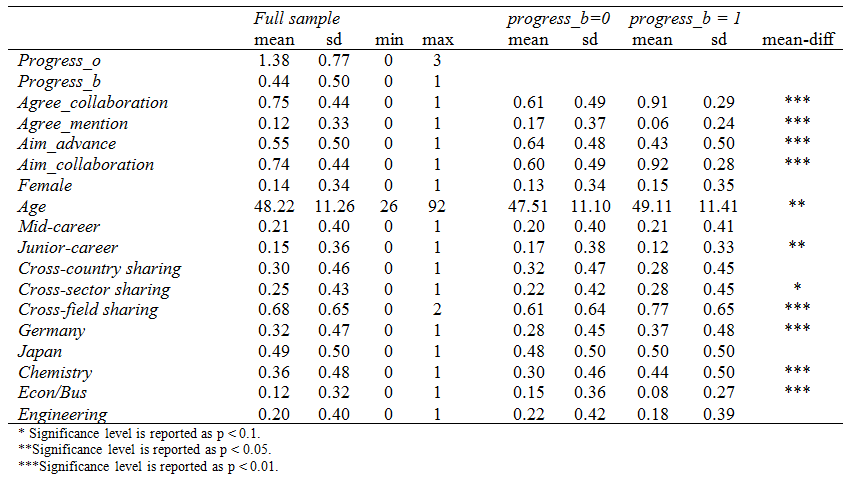 ## Results
## Results
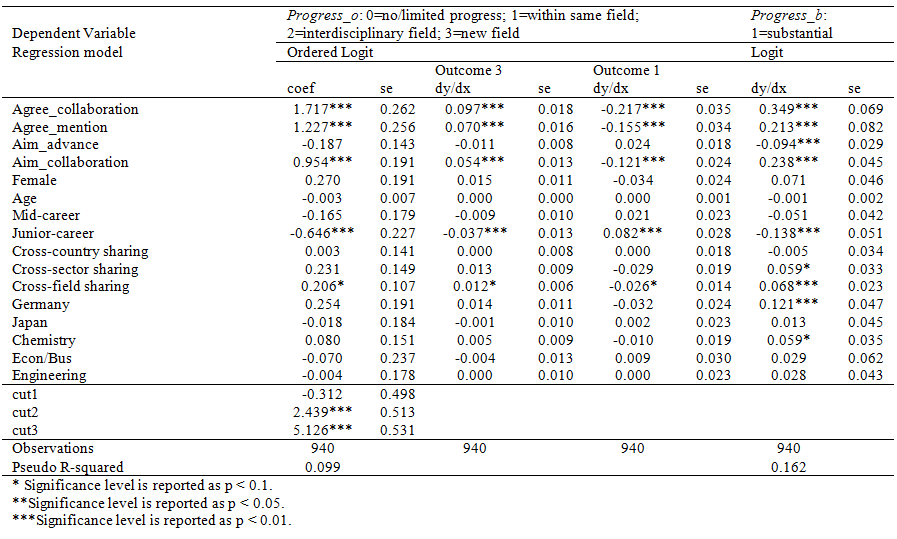 ## Results
## Results
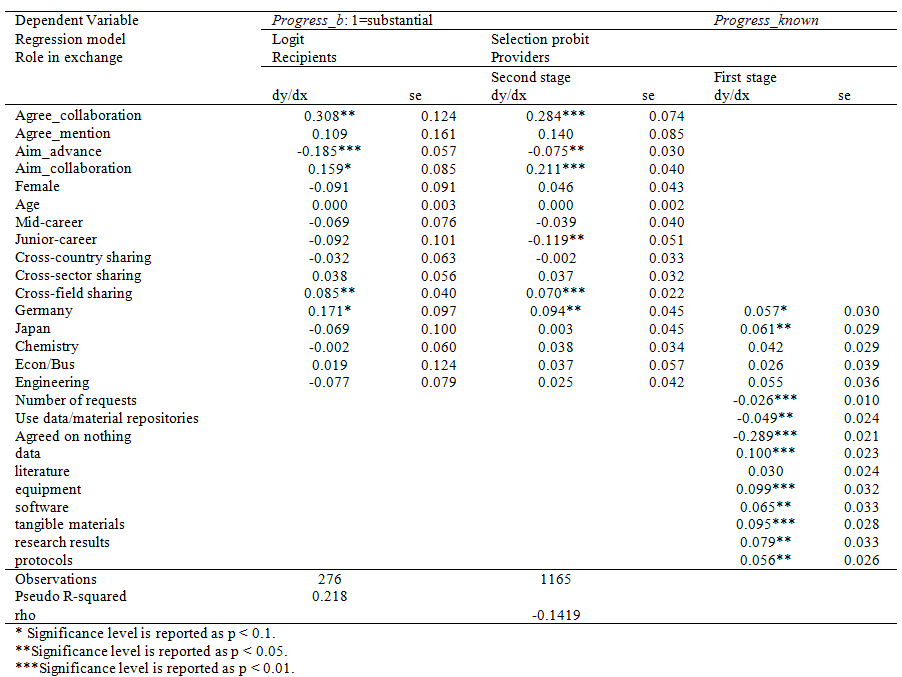 ## Extensions
- we currently ignore research of the involved parties
- will collaboration more likely lead to innovation if provider/recipient are top researchers?
- will collaboration less likely lead to innovation if provider/recipient is concerned with commercial application?
- preliminary evidence shows no support {in red}
- what about open repositories? {slide}
- 15% state that resource could be fully shared via open repositories
- about a quarter: tangible materials
- 15% report ownership conflicts
## Open science {image-slide}
## Extensions
- we currently ignore research of the involved parties
- will collaboration more likely lead to innovation if provider/recipient are top researchers?
- will collaboration less likely lead to innovation if provider/recipient is concerned with commercial application?
- preliminary evidence shows no support {in red}
- what about open repositories? {slide}
- 15% state that resource could be fully shared via open repositories
- about a quarter: tangible materials
- 15% report ownership conflicts
## Open science {image-slide}
use data/material repositories
open science promotes progress
/ − − automatically replaced by the title